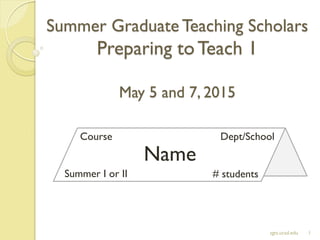
2015 SGTS Preparing to Teach 1: Your Course Syllabus
- 1. Summer Graduate Teaching Scholars Preparing toTeach 1 May 5 and 7, 2015 1sgts.ucsd.edu Name Course Dept/School Summer I or II # students
- 2. Preparing to Teach Workshops sgts.ucsd.edu 2 The aim of these workshops is to give you a well- supported head start on many of the things you should do to prepare for your classes, like creating a syllabus working out an assessment scheme drafting learning outcomes choose active learning strategies identify something you want to learn about your students and design a way to figure it out and more…
- 3. Who are you? sgts.ucsd.edu 3 Introduce yourself to the others at your table. what are you excited about? what are you nervous about?
- 4. Reminder: How People Learn sgts.ucsd.edu 4
- 5. How People Learn: Key Findings 1. Students come to the classroom with preconceptions about how the world works. If their initial understanding is not engaged, they may fail to grasp the new concepts and information that are taught, or they may learn them for purposes of a test but revert to their preconceptions outside the classroom. 2. To develop competence in an area of inquiry, students must: (a) have a deep foundation of factual knowledge, (b) understand facts and ideas in the context of a conceptual framework, and (c) organize knowledge in ways that facilitate retrieval and application. 3. A “metacognitive” approach to instruction can help students learn to take control of their own learning by defining learning goals and monitoring their progress in achieving them. sgts.ucsd.edu 5
- 6. Sort your cards into 3 sets of 3: sgts.ucsd.edu 6 Key Finding 2 Implication forTeaching Implication forTeaching Implication forTeaching Designing Classroom Environments
- 8. More than anything else, the best teachers try to create a natural critical learning environment: sgts.ucsd.edu 8 (Bain, p. 99)
- 9. More than anything else, the best teachers try to create a natural critical learning environment: sgts.ucsd.edu 9 natural because students encounter skills, habits, attitudes, and information they are trying to learn embedded in questions and tasks they find fascinating – authentic tasks that arouse curiosity and become intrinsically interesting, (Bain, p. 99)
- 10. More than anything else, the best teachers try to create a natural critical learning environment: sgts.ucsd.edu 10 natural because students encounter skills, habits, attitudes, and information they are trying to learn embedded in questions and tasks they find fascinating – authentic tasks that arouse curiosity and become intrinsically interesting, critical because students learn to think critically, to reason from evidence, to examine the quality of their reasoning using a variety of intellectual standards, to make improvements while thinking, and to ask probing and insightful questions about the thinking of other people. (Bain, p. 99)
- 11. In natural critical learning environments sgts.ucsd.edu 11 students encounter safe yet challenging conditions in which they can try, fail, receive feedback, and try again without facing a summative evaluation. fail receive feedback (Bain, p. 108) try
- 12. Scholarly Approach to Teaching sgts.ucsd.edu 12 What should students learn? What are students learning? What instructional approaches help students learn? Everything you value, from learning outcomes, to what will happen in class, to how your students will be assessed, should transparent to your students on the course syllabus. CarlWieman Science Education Initiative cwsei.ubc.ca
- 13. 3 Syllabi for MyDNA With the others at your table identify / verify the differences between the 3 syllabi evaluate the impact of the changes from 2010 to 2014 (impact on whom?) sgts.ucsd.edu 13
- 14. sgts.ucsd.edu 14
- 15. Example Syllabi CSE 3: Fluency with Information Technology (Beth Simon) MMW 11: Making of the Modern World (Matthew Herbst) HIEU 131:The French Revolution (Heidi Keller-Lapp) Take 10 minutes and look over these syllabi. Does anything surprise you? 15sgts.ucsd.edu
- 16. Next week: Learning outcomes Watch the blog sgts.ucsd.edu for details about what you should do to prepare for next week’s meeting. sgts.ucsd.edu 16
